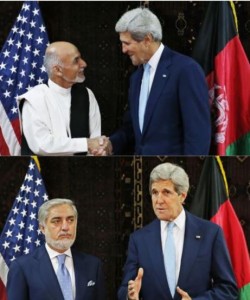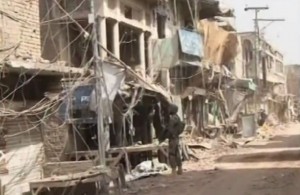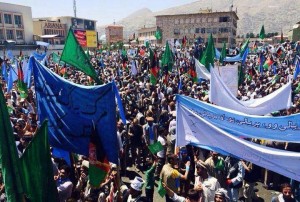Kerry, UN Fail to Resolve Afghan Election Crisis

Two photos from Reuters today sum up the status of the Afghan presidential election. Ghani appears confident and ready to work with Kerry, while Abdullah gives Kerry the side eye.
Three short weeks from tomorrow marks the date on which Afghanistan’s new president is to be sworn in. The problem, though, is that Abdullah Abdullah refuses to believe that he could have beaten Ashraf Ghani by a million votes in the first round and then lost to him by a million votes in the runoff a few weeks later. Both US Secretary of State John Kerry and the UN have tried to defuse the crisis, but neither effort has had any effect whatsoever.
No words are needed to describe Kerry’s failure. In their story on Kerry’s visit to Kabul today, Reuters carried photos of Ghani and Abdullah with Kerry in front of the same backdrop of US and Afghan flags. The photo of Ghani and Kerry could pass as a propaganda photo handed out jointly by the two governments to promote a continued relationship between the US and Afghanistan with Ghani as the new president. The photo with Abdullah, on the other hand, shows a deeply distrustful Abdullah casting a sideways glance at Kerry, who seems not to have the courage to look Abdullah in the eye, let alone shake hands as he did with Ghani. Perhaps Abdullah and Kerry did shake hands, but photographer Jim Bourg seems to have captured the essence of the crisis perfectly.
Meanwhile, the UN proposal for additional auditing has fallen flat. From the New York Times:
The United Nations proposal centered on a special audit of suspected fraudulent votes, and it appeared to be a winner when the office of President Hamid Karzai called reporters shortly after midnight Friday, the beginning of the Afghan weekend, to spread the news of the new plan.
Aimal Faizi, the spokesman for Mr. Karzai, said the president was backing the proposal, which involved a deeper audit of votes from 8,000 polling stations, or about 43 percent of the 8.1 million ballots cast. The plan had been presented to Mr. Karzai on Thursday evening by Jan Kubis, the special United Nations envoy for Afghanistan, who was to brief Mr. Abdullah and Mr. Ghani about it later on Friday, Mr. Faizi said.
But within minutes, Mr. Abdullah’s campaign said it had already made clear to United Nations officials that the plan was not acceptable during discussions on Thursday about possible ways out of the crisis. A senior aide to Mr. Abdullah said the campaign had its own plan, which would entail audits of votes from about 11,000 of the roughly 22,000 polling stations.
Western reports on the election crisis that I have read have danced around a very important central issue without ever addressing it. The huge problem that Afghanistan faces is that there is no real way to audit this election after the fact. Elections in Afghanistan do not take place in the way that elections in the West are conducted. Once outside of Kabul, Afghan society is structured around village life and women often live their entire lives without going outside the walls of the family compound. Village elders carry huge influence for all residents of the village.
In his book No Good Men Among the Living, Anand Gopal provided a couple of very informative vignettes of previous presidential elections. On page 156, we have this from the 2004 election: Read more →



